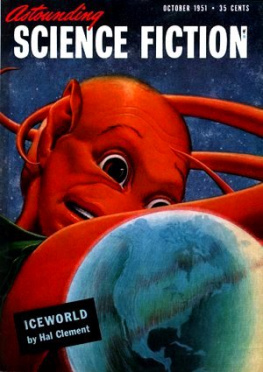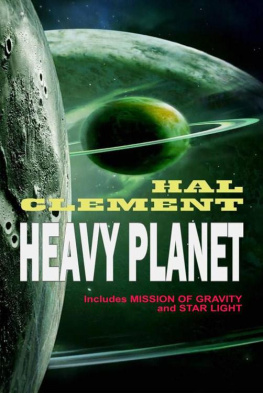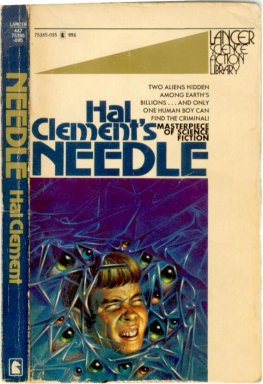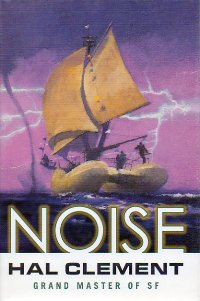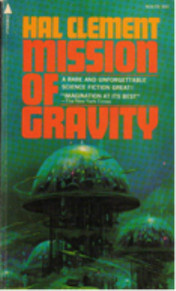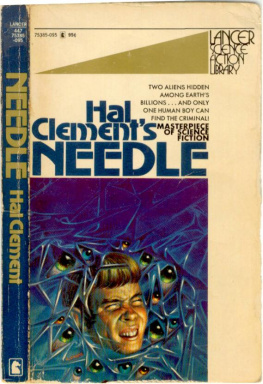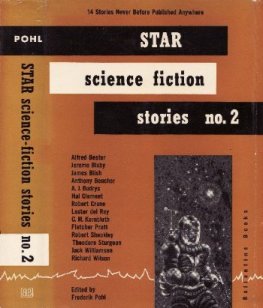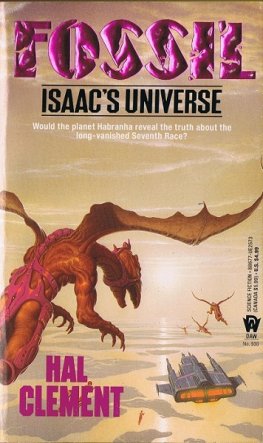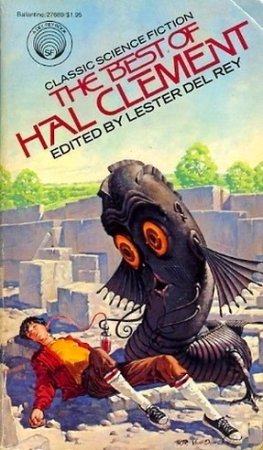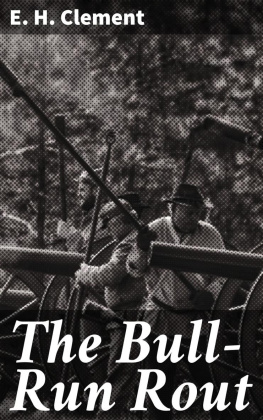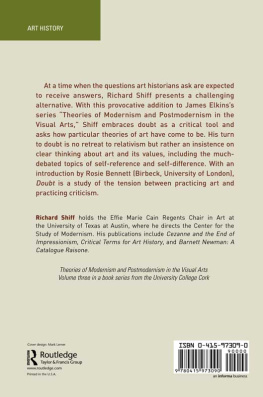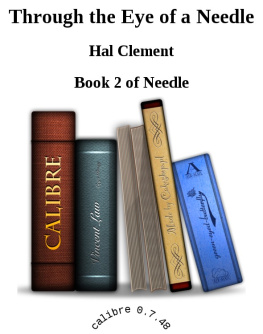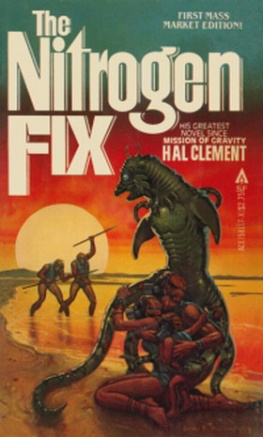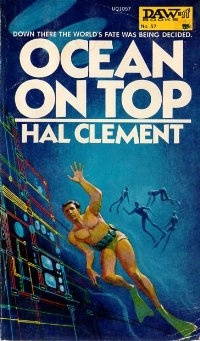Annotation
Iceworld is a humorously pointed novel of clashing perspectives, which we may designate as hot versus cold. Even for readers who have not seen H. R. van Dongen's fine cover painting for the novel's first installment in Astounding, Hal Clement does not keep us long in suspense that the planet which is unaccessible because of its climate of extreme cold is our own Earth. In contrast, the dismayed observer, the alien Sallman Ken (also on the cover, not to scale!), is truly hot-blooded. Clement genially introduces mitigating circumstances:
Earth, really, is not as bad as all that. Some people are even quite fond of it. Ken, of course, was prejudiced, as anyone is likely to be against a world where water is a liquid when he has grown up breathing gaseous sulfur and, at rare intervals, drinking molten copper chloride.
The mitigating circumstances are mutual, because we have two viewpoint threads alternating here, that of Sallman Ken who is evolved to live comfortably on his quite hot home-planet; Ken is a science teacher, not a scientist or expert but possessing a good general scientific knowledge. The other viewpoint is that of several members of a Terrestrial family who of course are evolved to live comfortably on our quite cold planet. The characters all are engaging, and Iceworld weaves their viewpoints, thoughts, and actions very well. The family on Earth includes young people of various ages, so this is a fine novel for teenagers as well as adults.
Sallman Ken has been brought to Earth or at least as close to it as the Iceworlds destructive climate will allow to solve a technical problem for a criminal syndicate of his race. They want a product found on Earth, one which is extremely valuable but so far unsynthesizable. What is it, in its natural state? How to boost their profits by getting or creating more of it? As defined, a general scientific problem, which is why the syndicate has engaged a schoolteacher with an all-around scientific knowledge. This in fact is Clement's own background and profession, so despite Ken's alienness, his character is drawn true to life.
The obvious physical barrier and scientific challenge is the scarcely imaginable temperature contrast between the aliens and the world of their interest. A differently tricky difficulty is that the rather unadventurous Ken has been talked into acting as an undercover investigator for his homeworld police. Naturally, the humans on the ground have their own motivations.
Hal Clement
Iceworld
ICEWORLD originally appeared In ASTOUNDING SCIENCE FICTION magazin
October, 1951
1
Sallman Ken had never been really sure of the wisdom he had shown in acceding to Rades request. He was no policeman and knew it. He had no particular liking for physical danger. He had always believed, of course, that he could stand his share of discomfort, but the view he was now getting through the Karellas port was making him doubt even that.
Rade had been fair enough, he had to admit. The narcotics chief had told him, apparently, everything he himself knew; enough so that Ken, had he used his imagination sufficiently, might even have foreseen something like this.
There has never been much of it, Rade had said. We dont even know what the peddlers call it its just a sniff to them. Its been around for quite a few years now; we got interested when it first appeared, and then took most of our attention from it when it never seemed to amount to much.
But whats so dangerous about it, then? Ken had asked.
Well, of course any habit-forming drug is dangerous you could hardly be a teacher of science without knowing that. The special menace of this stuff seems to lie in the fact that it is a gas, and can therefore be administered easily without the victims consent; and it seems to be so potent that a single dose will insure addiction. You can see what a public danger that could be. Ken had seen, clearly.
I should say so. Im surprised we havent all been overcome already. A generator in a buildings ventilation system on board a ship anything like that could make hundreds of customers for whoever has the stuff to sell. Why hasnt it spread? Rade had smiled for the first time.
There seems to be two reasons for that, also. There are production difficulties, if the very vague stories we hear have anything in them; and the stuff doesnt keep at normal temperature. It has to be held under extreme refrigeration; when exposed to normal conditions it breaks down in a few seconds. I believe that the active principle is actually one of the breakdown products, but no one had obtained a sample to prove it.
But where do I come in? If you dont have any of it I cant analyze it for you. I probably couldnt anyway Im a school teacher, not a professional chemist. What else can I do?
Its because youre a teacher a sort of jack-of-all-trades in scientific matters, without being an expert at any of them that we think you can help us. I mentioned that there seemed to be production troubles with the drug.
Certainly the producers would like to increase volume. They would like, of course, to get a first-rate production engineer. You know as well as I that they could never do it; no such person could be involved secretly in such a matter. Every competent engineer is well employed since Velio was discovered, and it would be too easy for us to trace one who was approached for such a purpose.
You, however, are a comparatively inconspicuous person; you are on vacation, and will be for another year; no one will miss you we expect these people to think. Thats why we took such extreme precautions in arranging this interview.
But youll have to publicize me some way, or they would never know I existed, either, Ken pointed out.
That can be done in fact, has already started. I trust youll forgive us for that; but the job is important. The whisper has already started in criminal circles that you are the manufacturer of the bomb that wrecked the Storm plant. We can give you quite a reputation
Which will prevent my ever getting an honest job again.
Which will never be heard of by your present employers, or by any respectable person not associated with the police.
Ken was not yet sure why he had accepted. Maybe the occupation of policeman still carried a little subconscious glamour, though certainly it was now mostly laboratory work. This looked like an exception or did it? He had as Rade expected been hired by an extremely short-spoken individual, who claimed to represent a trading concern. The understanding had been that his knowledge was to be placed at the disposal of his employers. Perhaps they would simply stick him in a lab with the outline or a production problem, and tell him to solve it. In that case, he would be out of a job very quickly, and if he were lucky might be able to offer his apologies to Rade.
For he certainly had learned nothing so far. Even the narcotics man had admitted that his people knew no one at all certainly connected with the ring, and it was very possible that he might be hired by comparatively respectable people compared, of course, to drug-runners. For all Ken could tell at the moment, that might have happened. He had been shepherded aboard the Karella at the North Island spaceport, and for twenty-two days had seen nothing at all.
He knew, of course, that the drug came from off the planet. Rade had become sufficiently specific to admit that the original rush had been checked by examining incoming refrigeration apparatus. He did not know, however, that it came from outside the Sarrian planetary system. Twenty-two days was a long journey if it had been made in a straight line.

